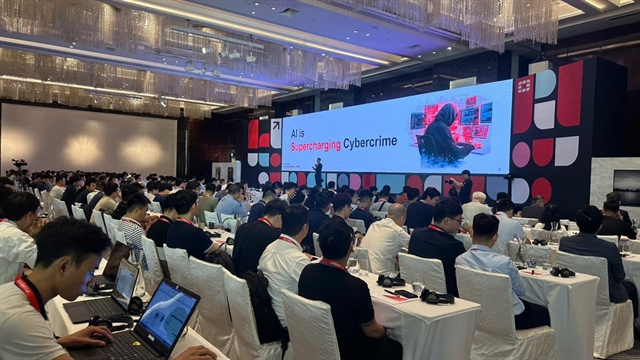A Fortinet survey has revealed a surge of AI-powered threats across Việt Nam, which have nearly tripled. Detection gaps are widening as AI-fuelled attacks reshape cybersecurity in the region.

HÀ NỘI — A new survey has revealed a sharp increase in both the volume and sophistication of cyber threats across Việt Nam and the Asia-Pacific region, according to cybersecurity company Fortinet.
The study, conducted by Fortinet's partner IDC, was unveiled during the 'Fortinet Accelerate Asia 2025 – Vietnam Edition' on Wednesday in Hà Nội, where industry leaders, visionaries and partners unite to shape the future of cybersecurity in the region.
It highlighted how attackers were rapidly adopting artificial intelligence (AI) to scale up stealthy, fast-moving attacks — leaving security teams struggling to detect them and respond in time.
The results revealed a threat landscape that was not only evolving in complexity, but also shifting toward gaps in visibility, governance and infrastructure, posing greater challenges to overstretched cybersecurity teams.
According to the survey, most firms felt that AI has become a key weapon in attackers' arsenals.
The rise of AI-enabled cybercrime is no longer theoretical. Nearly 52 per cent of organisations in Việt Nam said that they encountered AI-powered cyber threats in the past year. These threats were reportedly scaling fast, with a two-fold increase reported by 54 per cent of companies and a three-fold increase reported by 36 per cent of organisations.
Despite the rise in AI-driven attacks, only 8 per cent of organisations said they were confident in their ability to defend against them. Meanwhile, 30 per cent admitted that AI threats were outpacing their detection capabilities, and 33 per cent had no ability to track AI-powered threats, exposing a significant preparedness gap.
The survey revealed that the risk of cyberattacks is now a constant.
The cybersecurity landscape is no longer defined by episodic crises — it is in a state of constant exposure. Organisations in Việt Nam are increasingly vulnerable to threats that operate in the shadows.
The most reported threats included ransomware, software supply chain attacks, cloud vulnerabilities and insider threats.
The survey also reported other issues, including security resources facing significant constraints, a rise in investment that still lags behind risk, and platform-driven resilience amid increasing complexity.
“The findings of this survey point to a growing need for AI-accelerated defence strategies across the Asia-Pacific region, Japan and China," said Research Vice-President at IDC Asia-Pacific Simon Piff.
"Organisations are facing a surge in stealthy, complex threats — from misconfigurations and insider activity to AI-enabled attacks — that bypass traditional detection methods," Piff said.
"A shift toward integrated, risk-centric cybersecurity models is critical to staying ahead. In this new threat landscape, reactive security is no longer enough — predictive, intelligence-driven operations must become the norm.”
Fortinet Việt Nam's Country Manager Nguyễn Gia Đức said: “Complexity is now the new battleground in cybersecurity, and AI is both the challenge and the frontline defence.
"As threats grow quieter and more co-ordinated, Fortinet is helping organisations across Việt Nam stay ahead with a unified, platform-based approach that brings together visibility, automation and resilience."
"In today’s threat environment, speed, simplicity and strategy matter more than ever. Our focus is on helping customers shift from piecemeal defences to AI-powered security that’s built for scale and sophistication,” Đức added. — VNS





